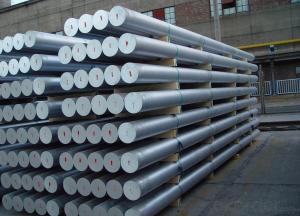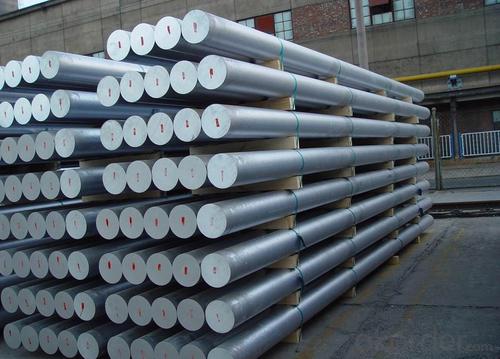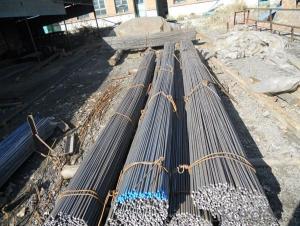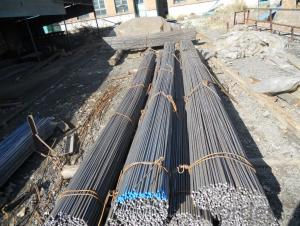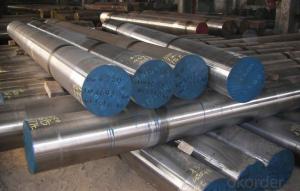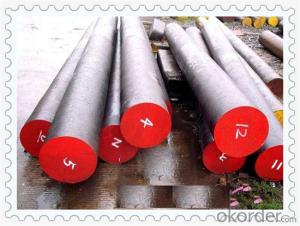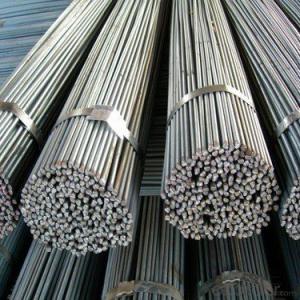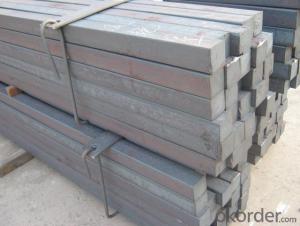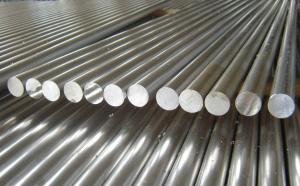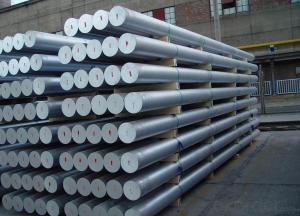high quality round bar 5MM-100MM Q235 ou Q195
- Loading Port:
- Shanghai
- Payment Terms:
- TT OR LC
- Min Order Qty:
- 25 m.t.
- Supply Capability:
- 20000 m.t./month
OKorder Service Pledge
OKorder Financial Service
You Might Also Like
ROUND BAR Details:
| Minimum Order Quantity: | Unit: | m.t. | Loading Port: | ||
| Supply Ability: | Payment Terms: | Package: | wire bundle |
Product Description:
Specifications of Wire Rod Q235:
Steel Grade: Q235, Standard: GB Diameter: 5.5mm, 6.5mm, 7mm,8mm,9mm,10mm,12mm,14mm
Diameter Tolerance:±0.3mm 6.5mm can be drawing into 2mm/8.0mm can be drawing into 3mm
Brand Name: N-RIVER Place of Origin: Hebei, China Mainland Application: construction, building etc
Chemical Composition:
Please kindly find our chemistry of our material based on Q235 as below for your information
Trademark | Rank | Chemical composition (quality score) % | |||||
C | Si | Mn | S | P | |||
| ≤ |
| ≤ | ≤ | |||
Q235 | A | 0.14-0.22 | 0.30 | 0.30-0.65 | 0.050 | 0.045 | |
Q235 | B | 0.12-0.20 | 0.30 | 0.30-0.70 | 0.045 | 0.045 | |
Trademark | Rank | Pulling Test | |||||
Bend PointΔs/Mpa | Tensile Strength | Elongation Ratioδ5% | |||||
Thickness (Diameter) /MM | Thickness (Diameter) /MM | ||||||
≤16 | 16-40 | ≤16 | 16-40 | ||||
≥ | ≥ | ||||||
Q235 | A | 235 | 225 | 375-500 | 26 | 25 | |
Q235 | B | 235 | 225 | 375-500 | 26 | 25 | |
Usage and Applications of Wire Rod Q235:
After hot-rolled the products shaped into coil and delivery as finished product, including round, square, rectangular, hexagonal and so on. Since most of the products are round, it is generally called wire rod. Carbon steel wire rod is widely used in construction and manufacturing. Carbon steel wire rod is mainly used for reinforcement of reinforced concrete and welded structure or reprocessed (roberts , nail, etc.) materials, especially used to produce wire drawing, welding electrode, nails, spring, electronic, precise machinery parts and so on.
Packaging & Delivery of Wire Rod Q235:
Packaging Detail: products are packed in coil and then shipped by container or bulk vessel
Each coil weight: 2-3MT
Delivery Detail: within 45 days after received deposit or LC.
Label: to be specified by customer, generally, each bundle has 1-2 labels
Trade terms: FOB, CFR, CIF
- Q: Are steel round bars suitable for the production of fasteners?
- Fasteners can be produced using steel round bars, which are a suitable choice. Steel is known for its strength and durability, enabling it to withstand high levels of tension and pressure. This makes it an ideal option for fasteners. Round bars, specifically, offer a smooth and even surface that can be easily machined and shaped into various types of fasteners like bolts, screws, and studs. The versatility of steel round bars allows for customization in terms of size, length, and surface finish. As a result, they are suitable for a wide range of fastening applications in industries such as construction, automotive, and manufacturing. Moreover, steel round bars exhibit excellent corrosion resistance properties when coated with protective finishes. This ensures that the fasteners have a long lifespan and can be relied upon.
- Q: What is the impact strength of a steel round bar?
- The ability of a steel round bar to withstand sudden forces or shocks without breaking or fracturing is referred to as its impact strength. This characteristic is a measure of the material's toughness and its ability to resist impact loads. Various factors, including the steel's composition, heat treatment, and any additional alloying elements, influence the impact strength of a steel round bar. To determine the impact strength, testing methods such as the Charpy or Izod impact test are typically employed. These tests involve striking a notched sample of the steel bar with a pendulum and measuring the amount of energy absorbed by the material before it fractures. The results are usually reported in terms of the energy absorbed in joules (J) or foot-pounds (ft-lb). The impact strength of a steel round bar can vary significantly depending on its grade or specification. Different grades of steel possess varying levels of toughness, making some more suitable for applications requiring high impact resistance, such as construction, automotive, or heavy machinery. On the other hand, certain grades may be better suited for less demanding applications. It should be noted that the impact strength is just one of several mechanical properties that must be considered when selecting a steel round bar for a specific application. Other factors, such as tensile strength, yield strength, hardness, and corrosion resistance, should also be taken into account to ensure the optimal performance and durability of the steel round bar in its intended use.
- Q: Are steel round bars available in custom sizes?
- Yes, steel round bars are available in custom sizes.
- Q: What are the advantages of using nickel-chromium-titanium alloy steel round bars?
- Some advantages of using nickel-chromium-titanium alloy steel round bars include their high strength and durability, excellent corrosion resistance, and good heat resistance. These alloy steel round bars also offer superior wear resistance and can withstand harsh environments. Additionally, they have good machinability, making them suitable for various applications in industries such as aerospace, automotive, and oil and gas.
- Q: Can steel round bars be used for making turbine blades?
- No, steel round bars are typically not used for making turbine blades. Turbine blades are often made from materials such as titanium or nickel-based superalloys, which provide the necessary strength, heat resistance, and aerodynamic properties required for efficient turbine operation.
- Q: Can steel round bars be used for making cutting tools?
- Yes, steel round bars can be used for making cutting tools. Steel is a versatile material that can be hardened and tempered to create sharp and durable cutting edges. Round bars can be machined and shaped into various cutting tool profiles such as drills, lathe tools, milling cutters, and punches. The specific type of steel used will depend on the desired cutting application, as different steel alloys have different properties such as hardness, toughness, and wear resistance. Heat treatment processes like quenching and tempering can further enhance the cutting performance and longevity of the tools. Overall, steel round bars provide a reliable and cost-effective option for manufacturing cutting tools.
- Q: What is the difference between carbon steel and alloy steel round bars?
- Carbon steel and alloy steel round bars are both widely used in various industries, but they differ in their composition and properties. Carbon steel round bars are primarily made up of iron and carbon, with trace amounts of other elements. The carbon content typically ranges from 0.05% to 2.0%, depending on the grade. These bars are known for their strength and hardness, making them suitable for applications that require high durability and wear resistance. Carbon steel round bars also have good machinability, meaning they can be easily shaped and formed into desired configurations. However, they may have limited corrosion resistance and may require additional protective coatings in corrosive environments. On the other hand, alloy steel round bars are made by adding various alloying elements to carbon steel. These alloying elements can include elements such as manganese, chromium, nickel, and molybdenum, among others. The addition of these elements enhances the properties of the steel, such as increased strength, toughness, and resistance to wear and corrosion. Alloy steel round bars are often chosen for applications that require specific properties, such as high temperature resistance, high strength-to-weight ratio, or improved machinability. In summary, the main difference between carbon steel and alloy steel round bars lies in their composition and resulting properties. Carbon steel round bars are primarily made up of iron and carbon, offering good strength and hardness, but may have limited corrosion resistance. Alloy steel round bars, on the other hand, have added alloying elements that enhance specific properties, such as increased strength, toughness, and corrosion resistance. The choice between carbon steel and alloy steel round bars will depend on the specific requirements of the application.
- Q: What is the minimum yield strength of steel round bars?
- The minimum yield strength of steel round bars can vary depending on the specific grade and type of steel being used. However, most commonly used carbon steels have a minimum yield strength of around 36,000 to 50,000 pounds per square inch (psi).
- Q: How are steel round bars tested for quality?
- Steel round bars are tested for quality through various methods to ensure that they meet the required standards and specifications. One common test is the visual inspection, which involves examining the bars for any visible defects such as surface cracks, pits, or deformities. This is done by highly skilled personnel who are trained to identify any irregularities that may affect the quality of the steel bars. Another important test is the dimensional inspection, which measures the diameter, length, and straightness of the round bars. This ensures that the bars are within the specified tolerances and that they meet the required dimensions for their intended use. Mechanical testing is also conducted to assess the strength and mechanical properties of the steel bars. This includes tests like tensile strength, yield strength, and elongation, which determine how the bars will perform under various loads and conditions. These tests are carried out using specialized equipment and provide valuable information about the structural integrity and quality of the steel bars. Furthermore, chemical composition analysis is performed to verify that the steel bars contain the correct proportions of different elements such as carbon, manganese, and alloying elements. This analysis is crucial as it determines the suitability of the bars for specific applications and ensures that they possess the desired characteristics. In addition to these tests, non-destructive testing methods such as ultrasonic testing, magnetic particle inspection, or dye penetrant testing may also be employed. These techniques can detect internal or surface defects that may not be visible to the naked eye and provide further assurance of the quality and integrity of the steel bars. Overall, a combination of visual inspection, dimensional inspection, mechanical testing, chemical composition analysis, and non-destructive testing methods is used to thoroughly assess the quality of steel round bars. These rigorous testing processes help to ensure that the bars meet the required standards and specifications, providing customers with high-quality and reliable steel products.
- Q: What are the different types of steel alloys used for round bars?
- There are several different types of steel alloys used for round bars, each offering unique properties and characteristics that make them suitable for various applications. Some of the commonly used steel alloys for round bars include: 1. Carbon Steel: This is the most common type of steel alloy used for round bars. It contains primarily carbon and iron, and offers excellent strength and toughness. Carbon steel round bars are commonly used in construction, manufacturing, and general engineering applications. 2. Stainless Steel: This alloy contains chromium, which provides corrosion resistance and makes it suitable for applications where rust or oxidation is a concern. Stainless steel round bars are widely used in the food and beverage industry, as well as in marine and chemical industries. 3. Alloy Steel: This type of steel alloy is made by adding other elements such as manganese, nickel, or chromium to improve its mechanical properties. Alloy steel round bars are known for their high strength, hardness, and resistance to wear and tear. They are commonly used in automotive, aerospace, and machinery industries. 4. Tool Steel: Tool steel alloys are specifically designed to have high hardness, wear resistance, and toughness. They are used for making cutting tools, dies, and molds. Tool steel round bars are available in various grades, such as D2, O1, and A2, each with specific properties for different applications. 5. Duplex Steel: This alloy contains a combination of austenitic and ferritic stainless steels, offering a combination of high strength and corrosion resistance. Duplex steel round bars are used in applications where both strength and resistance to corrosion are required, such as in the oil and gas industry. These are just a few examples of the different types of steel alloys used for round bars. The specific choice of alloy depends on the desired properties and the intended application of the round bar.
Send your message to us
high quality round bar 5MM-100MM Q235 ou Q195
- Loading Port:
- Shanghai
- Payment Terms:
- TT OR LC
- Min Order Qty:
- 25 m.t.
- Supply Capability:
- 20000 m.t./month
OKorder Service Pledge
OKorder Financial Service
Similar products
Hot products
Hot Searches
Related keywords
